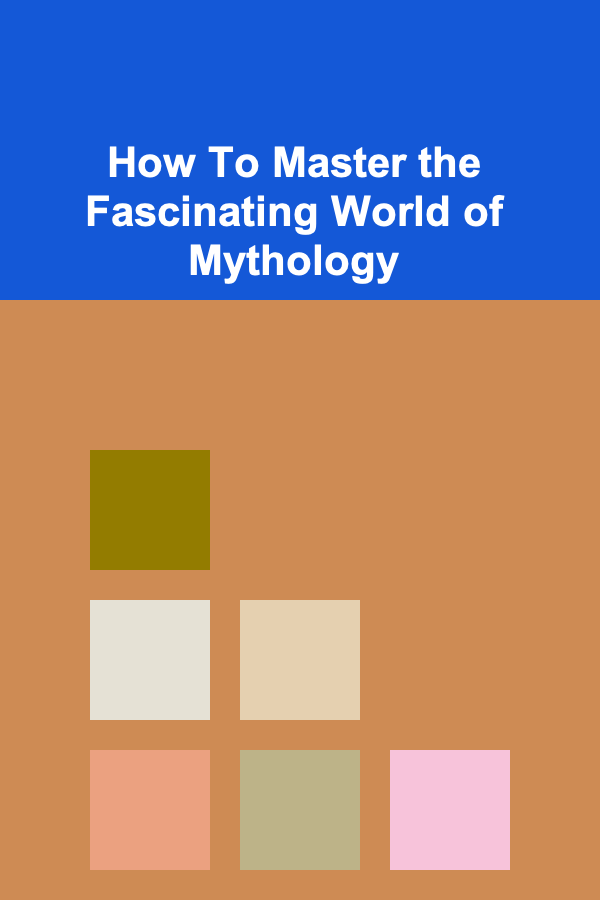
How To Master the Fascinating World of Mythology
ebook include PDF & Audio bundle (Micro Guide)
$12.99$8.99
Limited Time Offer! Order within the next:

Mythology is a powerful lens through which to explore the vastness of human culture, history, and imagination. From the ancient myths of Greece and Rome to the more obscure, yet equally compelling, mythologies of the Indigenous peoples of North America, mythology offers a window into the values, fears, and beliefs of societies long past. But mythology is not merely the study of ancient stories; it's the study of the eternal themes that continue to shape our understanding of the world. Whether you are a scholar or simply someone fascinated by the stories of gods, heroes, and monsters, mastering the world of mythology requires a deep commitment to understanding the many facets of these narratives.
This guide will take you on a journey through how to master the world of mythology. It will cover essential concepts, methods of study, and the key steps in engaging deeply with these stories. By the end of this article, you will be better equipped to explore and appreciate the richness of mythology, both ancient and modern.
Understanding What Mythology Is
Before you dive deep into the world of mythology, it's essential to understand what mythology is and what it aims to achieve. At its core, mythology is a collection of stories that explain the origins, customs, and moral values of a culture. These stories often involve gods, supernatural beings, legendary heroes, and mythical creatures, all woven together to give meaning to the world.
Mythology differs from religion in that it is often more symbolic, more universal in its themes, and may not be a belief system but a representation of a culture's worldview. While religions still exist today in many forms and are often practiced by living communities, mythology often deals with stories from past cultures that are no longer followed in their original form.
Key Functions of Mythology
- Cultural Explanation: Myths often serve to explain the natural world, societal practices, or historical events in a way that gives them meaning.
- Moral Lessons: Many myths contain embedded lessons about virtue, morality, and the consequences of certain actions. These lessons are meant to guide behavior.
- Entertainment and Imagination: Mythology also serves as a source of entertainment. The fantastical nature of the stories can inspire awe and wonder, sparking the imagination of those who hear or read them.
- Identity and Belonging: Myths are often a source of cultural identity. They help define the people who tell them, offering a shared narrative that binds a community together.
The Importance of Mythology
To understand human history, culture, and psychology, one must explore mythology. By examining the mythological tales of different civilizations, we gain insight into the universal questions that all humans face, such as life, death, creation, and destruction. The characters in these myths, whether gods or mortals, are often reflections of ourselves, providing us with mirrors through which we can understand our own motivations, fears, and desires.
Different Types of Mythologies
Mythology is not a monolithic concept, and there are many different mythological traditions to explore. Some of the most prominent include:
2.1. Greek and Roman Mythology
The mythology of Ancient Greece and Rome is perhaps the most well-known in the Western world. The Greek pantheon, with gods like Zeus, Hera, and Poseidon, and epic heroes such as Hercules and Achilles, has had a profound influence on Western culture and thought. Roman mythology, which borrowed heavily from Greek mythology, also features gods like Jupiter, Mars, and Venus. Both mythologies explore themes of fate, justice, love, and the human condition.
- Key Myths to Study: The Iliad, The Odyssey, the Twelve Labors of Hercules, The Aeneid.
2.2. Norse Mythology
Norse mythology is rich with tales of gods, giants, and otherworldly beings. It originates from the Scandinavian region and is characterized by its focus on fate, destiny, and heroism. The gods of Norse mythology, like Odin, Thor, and Freyja, are often portrayed as powerful but flawed beings who face an inevitable end at Ragnarok, the apocalypse.
- Key Myths to Study: The Poetic Edda, The Prose Edda, and the myths surrounding Thor, Odin, and Loki.
2.3. Egyptian Mythology
The mythology of ancient Egypt centers around a complex pantheon of gods and goddesses, many of whom are associated with natural elements such as the sun, the Nile River, and death. The most famous of these are gods like Ra, Osiris, Isis, and Anubis. Egyptian mythology is deeply intertwined with the culture's beliefs about the afterlife, the soul, and cosmic order.
- Key Myths to Study: The story of Osiris, the journey of the soul in the afterlife, and the creation myths.
2.4. Hindu Mythology
Hindu mythology is one of the oldest in the world and is rich with gods, sages, and supernatural beings. The mythology is closely connected with religious practices and the philosophy of dharma (righteous duty). Major deities like Vishnu, Shiva, and Brahma represent different aspects of the divine, and many of the myths come from the vast body of Hindu scriptures, including the Vedas, Upanishads, and epics like the Mahabharata and Ramayana.
- Key Myths to Study: The Bhagavad Gita, the Ramayana, and the Mahabharata.
2.5. Native American Mythology
Each Native American tribe has its own rich set of myths and stories, often connected to nature, the cosmos, and ancestral spirits. Common themes include the creation of the world, the relationship between humans and nature, and the teachings of ancestors. Native American mythology tends to be more localized, with each tribe having distinct tales and heroes.
- Key Myths to Study: The Great Spirit, stories of tricksters like Coyote, and the creation myths of various tribes.
2.6. African Mythology
African mythology encompasses a wide range of traditions from the many diverse cultures across the continent. These myths often focus on themes of creation, ancestors, and the interplay between the physical and spiritual worlds. Gods and deities are often portrayed as having direct influence over nature and human behavior.
- Key Myths to Study: The creation myths of the Yoruba, the stories of Anansi the spider, and the myths of the Dogon people.
Approaching the Study of Mythology
To master mythology, you must approach it not only as a collection of fascinating tales but as a study of culture, psychology, history, and human expression. Here are key steps to help you embark on your journey:
3.1. Start with Core Texts
Mythological texts and epics are the backbone of any mythology. To truly master mythology, it's crucial to begin with the foundational works of the cultures you are interested in. This could involve reading ancient texts, modern retellings, or scholarly analyses.
- Greek Mythology: The Iliad, The Odyssey, and works by authors like Hesiod.
- Norse Mythology: The Poetic Edda and The Prose Edda.
- Hindu Mythology: The Vedas, Upanishads, Mahabharata, and Ramayana.
As you read, pay attention to recurring themes, symbolic representations, and the relationships between characters. This will give you deeper insights into the mythology.
3.2. Learn the Context and Cultural Background
Understanding the cultural, historical, and geographical context of myths is crucial. Myths don't exist in a vacuum; they are shaped by the societies that create them. Learning about the political, social, and economic conditions of ancient civilizations can help you understand the motivations behind certain myths.
- For example, understanding the significance of the Trojan War in Greek mythology requires knowledge of the geopolitical conflicts of the time.
- Similarly, Norse myths reflect a culture deeply concerned with fate, the harshness of nature, and the inevitability of death, which is reflected in their myths about Ragnarok.
3.3. Identify Common Themes Across Myths
Many myths, regardless of their cultural origins, explore similar themes, such as creation, destruction, love, sacrifice, and the afterlife. By identifying these recurring themes, you can gain a better understanding of the universal aspects of human experience that mythology seeks to explain.
- Creation myths, for example, are nearly universal. Every culture has a story explaining how the world came into being.
- Similarly, many myths feature heroes who must undergo trials, often involving journeys or quests, that teach lessons about growth and sacrifice.
3.4. Explore Modern Interpretations and Adaptations
While ancient myths are valuable in their original form, modern interpretations and adaptations can shed new light on these stories. Many works of literature, film, and art draw inspiration from mythology, offering fresh perspectives on ancient tales.
- Modern authors like Neil Gaiman (American Gods), Rick Riordan (Percy Jackson series), and Madeline Miller (Circe) have brought mythology to life in new and engaging ways for contemporary audiences.
- Films, from Disney's Hercules to Marvel's Thor series, often take creative liberties with ancient myths, offering a more accessible entry point for new learners.
3.5. Engage with Scholarly Analysis
Mythology is a field of study with a rich body of academic work. Scholars in fields like anthropology, comparative religion, and literary studies have written extensively about mythological themes and figures. Engaging with scholarly analysis can help deepen your understanding of these myths beyond the surface level.
- Comparative mythology, pioneered by scholars like Joseph Campbell and Mircea Eliade, explores the commonalities between different mythologies, revealing archetypes and patterns that transcend individual cultures.
- Understanding symbolic interpretation and the psychology behind myths (as seen in Carl Jung's work) can help you connect mythological stories to universal human experiences.
Conclusion
Mastering the fascinating world of mythology is a lifelong journey that requires a passion for exploration, an open mind, and an understanding of the cultural contexts in which these myths were born. By starting with foundational texts, exploring the context of each culture, and recognizing the recurring themes across different mythologies, you will be able to unlock the timeless wisdom and imaginative power of these stories. Whether you're looking to understand ancient civilizations, gain insight into the human condition, or simply enjoy the richness of these tales, mythology offers an unparalleled path to understanding our collective past and, by extension, our present and future.
Reading More From Our Other Websites
- [Organization Tip 101] How to Create a Supply Rotation System for New Items
- [Home Cleaning 101] How to Effectively Tackle Pet Hair in Your Home
- [Organization Tip 101] Why An Organized Craft Room Sparks Creativity
- [Home Space Saving 101] How to Organize Your Home Office to Maximize Desk Space
- [Personal Care Tips 101] How to Clean Makeup Brushes: Essential Tips for Hygiene and Longevity
- [Home Rental Property 101] How to Offer Green and Energy-Efficient Features in Your Rental Property
- [Organization Tip 101] How to Designate a Space for Non-Food Items in Your Pantry
- [Home Space Saving 101] How to Use a Pegboard for Creative Organization
- [Organization Tip 101] How to Manage Thread Storage to Prevent Tangling
- [Personal Care Tips 101] How to Use Brow Gel for a Fluffy, Laminated Brow Look

How to Create a Comprehensive Checklist for Team Building Activities
Read More
How to Handle Maintenance Requests from Tenants Professionally
Read More
How to Make a Plan for Paying Off Student Loans
Read More
How to Use Smart Home Features to Enhance Your Staging
Read More
The Power of Risk Taking: How to Stand Out by Embracing Uncertainty
Read More
How to Move with Pets: A Comprehensive Checklist
Read MoreOther Products

How to Create a Comprehensive Checklist for Team Building Activities
Read More
How to Handle Maintenance Requests from Tenants Professionally
Read More
How to Make a Plan for Paying Off Student Loans
Read More
How to Use Smart Home Features to Enhance Your Staging
Read More
The Power of Risk Taking: How to Stand Out by Embracing Uncertainty
Read More